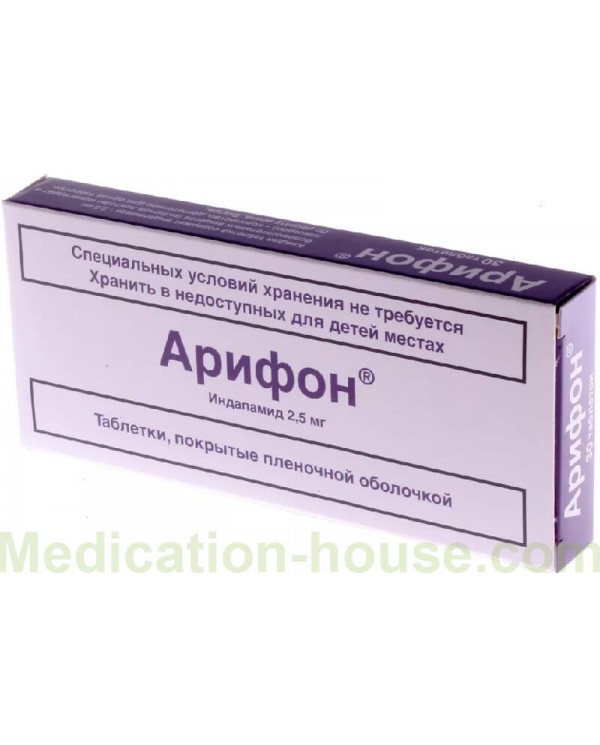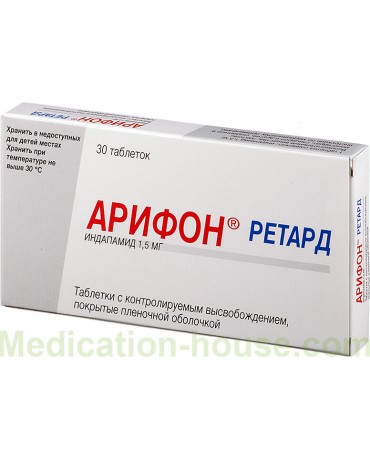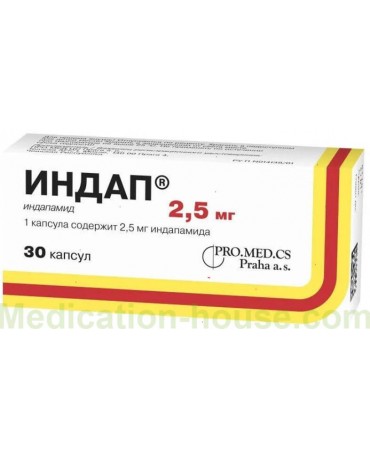Instruction for Arifon
You can buy Arifon on this page
Arifon is a drug that has a diuretic, vasodilator and hypotensive (pressure reducing) effect.
Release form and composition
Arifon is produced in the form of film-coated tablets (30 pcs. In a blister, in a cardboard box, 1 blister each).
1 tablet contains 2.5 mg of active active ingredient - indapamide.
The auxiliary components are: povidone, magnesium stearate, lactose monohydrate, corn starch, talc.
The composition of the film shell: glycerol, macrogol 6000, magnesium stearate, hypromellose, sodium lauryl sulfate, titanium dioxide, white beeswax.
Pharmacodynamics
Indapamide is a sulfonamide derivative, and its pharmacological properties are similar to those of thiazide diuretics. It increases the excretion of chlorine and sodium ions through the kidneys and, to a lesser extent, magnesium and potassium ions, which leads to increased diuresis. Arifon is characterized by an antihypertensive effect when used in doses that do not have a pronounced diuretic effect. The effectiveness of indapamide in patients with one kidney has also been proven.
The mechanism of action of the active component of Arifon on the vessels is to activate the synthesis of prostacyclin PGI2 and prostaglandin PGE2 (an inhibitor of platelet aggregation and vasodilator) and change the transmembrane current of ions (primarily calcium), which causes relaxation of vascular smooth muscle cells. Indapamide helps to reduce left ventricular hypertrophy. During the course of Arifon therapy, short-term, medium-term or long-term, the parameters of carbohydrate metabolism, including patients with arterial hypertension and diabetes mellitus, and lipid metabolism, including the content of high density lipoproteins, low density lipoproteins, cholesterol and triglycerides, practically do not change.
Exceeding the dose of Arifon in comparison with the recommended dose does not provoke an increase in the antihypertensive effect, but may contribute to the occurrence of pronounced adverse reactions. If drug treatment does not give the desired therapeutic result, the dose of the drug should not be increased.
Pharmacokinetics
The bioavailability of indapamide is 93%. After a single oral administration of Arifon at a dose of 2.5 mg, the maximum concentration of the active substance in the blood plasma is achieved after 1-2 hours.
Approximately 75% of indapamide binds to blood plasma proteins. Its half-life varies from 14 to 24 hours (average value is 18 hours). With regular intake of Arifon, the equilibrium concentration of its active component in the blood plasma increases compared with a single dose. At the same time, the achieved equilibrium state remains for a long period of time, which indicates the absence of accumulation of indapamide in the body upon repeated administration of the drug.
Indapamide forms pharmacologically inactive metabolites, in the form of which it is excreted mainly through the kidneys (up to 60-80% of the dose taken). In unchanged form, the substance is excreted from the body with urine in an amount not exceeding 5% of the dose taken. In patients with renal dysfunction, the pharmacokinetic parameters of indapamide remain unchanged.
Indications for use
According to the instructions, Arifon is indicated for arterial hypertension.
Contraindications
Hypersensitivity;
Hypokalemia;
Severe liver failure;
Lactation period;
Children under the age of 18;
Lactose intolerance, galactose / glucose malabsorption syndrome, galactosemia.
Arifon should be taken with caution in renal and / or hepatic failure, impaired water and electrolyte metabolism, hyperparathyroidism, hyperuricemia (especially with urate nephrolithiasis or gout), pregnancy.
Instructions for use: method and dosage
Arifon tablets should be taken orally, preferably in the morning, at the same time, the initial dose is 1.25-2.5 mg.
If therapy for 4-8 weeks does not have the desired effect, the dose should not be increased (this will not give a noticeable increase in the result, but it can lead to an increase in negative concomitant manifestations).
Side effects
The use of Arifon can provoke the following negative side effects:
Cardiovascular system: palpitations, arrhythmias, ECG changes (a consequence of hypokalemia), orthostatic hypotension;
Nervous system: drowsiness or insomnia, asthenia, nervousness, dizziness, headache, vertigo, fatigue, depression, general malaise, tension, anxiety, irritability, muscle spasm;
Respiratory organs: rhinitis, sinusitis, pharyngitis, cough;
Genitourinary system: polyuria, nocturia;
Digestive system: diarrhea or constipation, nausea, vomiting, dyspepsia, abdominal pain, anorexia, pancreatitis, hepatic encephalopathy due to liver failure;
Hematopoietic organs: hemolytic anemia, leukopenia, thrombocytopenia, agranulocytosis, bone marrow aplasia;
Immune system: allergic responses (urticaria, pruritus, maculopapular rash, hemorrhagic vasculitis);
Other: exacerbation of systemic lupus erythematosus.
Taking Arifon can cause such laboratory parameters as hypochloremia, hyperuricemia, hypercalcemia, hyponatremia, hypokalemia, hyperglycemia, hypercreatininemia, increased blood urea nitrogen.
Overdose
Taking indapamide even in very high concentrations (up to 40 mg, which is almost 16 times higher than the recommended dose) is not accompanied by a toxic effect on the body.
Symptoms of acute poisoning with Arifon are primarily due to a violation of the water-electrolyte balance (hypokalemia, hyponatremia). Signs of drug overdose include polyuria or oliguria, leading to anuria due to hypovolemia, nausea, vomiting, blurred consciousness, drowsiness, dizziness, arterial hypotension, seizures. In this case, the patient needs to be provided with emergency care, which contributes to the fastest possible elimination of indapamide from the body. It consists in washing the stomach and / or taking activated charcoal, followed by the normalization of the water-electrolyte balance.
Special instructions
It is recommended to carefully monitor the content of potassium and creatinine in elderly patients, and in patients taking laxatives and / or cardiac glycosides against the background of hyperaldosteronism.
It is necessary to systematically check the concentration of sodium, potassium, magnesium in the blood plasma in order to avoid the development of electrolyte disturbances as a result of taking Arifon. It should be tested regularly for pH, uric acid, residual nitrogen and glucose. These indicators should be especially carefully monitored for liver cirrhosis, coronary heart disease, chronic heart failure and elderly patients.
At the beginning of therapy with Arifon (in the first week), the first measurement of the concentration of potassium in the blood should be taken.
Patients with diabetes mellitus, especially in combination with hypokalemia, it is very important to regularly monitor the concentration of glucose in the blood.
The cause of hypercalcemia that manifested itself against the background of taking the drug may be previously undiagnosed hyperparathyroidism.
At first, when taking Arifon, careful monitoring of renal function is necessary to timely compensate for water loss, since significant dehydration can cause the development of acute renal failure (decrease in glomerular filtration).
The use of Arifon in athletes can give a positive reaction under doping control.
Do not prescribe the drug to children and adolescents because of the unproven safety of use.
Influence on the ability to drive vehicles and complex mechanisms
The action of indapamide and other substances that make up Arifon does not affect the patient's ability to perform potentially hazardous types of work that require quick psychomotor reactions. It is recommended to observe precautions when driving vehicles (especially at the beginning of treatment or during complex therapy, including the use of other antihypertensive drugs).
Application during pregnancy and lactation
Usually, during pregnancy, it is not recommended to prescribe indapamide, like other diuretic drugs. Their use is not allowed to eliminate physiological edema in pregnant women. Arifon can provoke placental ischemia and cause fetal developmental disorders. Nevertheless, indapamide is used in the treatment of renal, hepatic and cardiac edema in pregnant patients.
Arifon should not be prescribed during lactation, since indapamide passes into breast milk.
Drug interactions
The combination of indapamide and lithium preparations can lead to an increase in the level of lithium in the blood plasma, due to a decrease in its excretion and accompanied by the appearance of symptoms of lithium overdose. If necessary, it is allowed to use Arifon simultaneously with lithium preparations, however, the dose of the drugs must be carefully selected. It is also necessary to regularly monitor the concentration of lithium in the blood plasma.
The combination of indapamide and drugs that can provoke arrhythmias of the "pirouette" type increases the risk of developing ventricular arrhythmias, especially arrhythmias of this type (hypokalemia is a risk factor). These drugs include:
some antipsychotics: butyrophenones (haloperidol, droperidol), phenothiazines (trifluorperazine, chlorpromazine, thioridazine, levomepromazine, cyamemazine), benzamides (tiapride, amisulpride, sultopride, sulpiride);
class IA antiarrhythmic drugs (disopyramide, hydroquinidine, quinidine);
class III antiarrhythmic drugs (ibutilide, dofetilide, amiodarone) and sotalol;
others: vincamine (when administered intravenously), bepridil, astemizole, cisapride, moxifloxacin, diphemanil, sparfloxacin, erythromycin (when administered intravenously), pentamidine, mizolastine, halofantrine.
It is recommended to determine the concentration of potassium in the blood plasma and, if necessary, adjust it before starting the combination therapy, which includes the above drugs and Arifon. Monitoring of the patient's clinical condition, determination of the content of electrolytes in the blood plasma and monitoring of ECG indicators should not be neglected. In patients with hypokalemia, it is recommended to use drugs that do not provoke pirouette-type arrhythmias.
Co-administration of indapamide with salicylates taken in high doses (3 g or more per day) and non-steroidal anti-inflammatory drugs (with systemic use), including selective inhibitors of cyclooxygenase-2 (COX-2), can lead to a weakening of the antihypertensive effect of Arifon ... Also, with a significant loss of fluid in this case, acute renal failure sometimes develops due to a decrease in the glomerular filtration rate. Regular monitoring of kidney function is recommended both at the beginning of therapy and during treatment, as well as compensation for fluid loss.
The combination of indapamide and angiotensin-converting enzyme (ACE) inhibitors when used in patients with hyponatremia (especially in patients with renal artery stenosis) increases the risk of acute renal failure and / or sudden arterial hypotension. Patients with arterial hypertension and, possibly, a reduced concentration of sodium ions in the blood plasma (due to the diuretic effect of indapamide) should, 3 days before starting therapy with an ACE inhibitor, discontinue the diuretic (in the future, if necessary, it can be taken again) or start treatment with an ACE inhibitor with minimum doses, gradually increasing them if necessary. In chronic heart failure, it is recommended to start taking ACE inhibitors with low doses with a possible preliminary reduction in the dose of indapamide. In all patients, in the first week of using ACE inhibitors, renal function (plasma creatinine concentration) should be monitored.
The use of indapamide in conjunction with other drugs that can cause hypokalemia [laxatives that stimulate intestinal motility, amphotericin B (with intravenous administration), tetracosactide, mineral and glucocorticosteroids (with systemic administration)] increases the risk of hypokalemia due to an additive effect. In this case, the level of potassium in the blood plasma should be regularly monitored and, if necessary, adjusted. Particular attention should be paid to patients receiving cardiac glycosides simultaneously with Arifon. It is recommended to use laxatives that do not stimulate intestinal motility.
The combination of baclofen and indapamide may increase the antihypertensive effect. At the beginning of treatment, it is necessary to carefully monitor kidney function and compensate for fluid loss.
The combined intake of indapamide and cardiac glycosides can enhance the toxic effect of the latter due to hypokalemia. Therefore, during treatment, you should take care of constant monitoring of the concentration of potassium in the blood plasma and ECG indicators, in order to adjust the dose of drugs if necessary.
The simultaneous appointment of potassium-sparing diuretics (triamterene, spironolactone, amiloride) and indapamide is considered appropriate in some patients, however, the risk of hypokalemia (especially in patients with renal failure or diabetes mellitus) or hyperkalemia is not excluded. For this reason, it is recommended to carry out constant monitoring of ECG indicators and the concentration of potassium in the blood plasma for the timely correction of doses of drugs.
While taking indapamide with the simultaneous administration of metformin, functional renal failure may develop, increasing the likelihood of developing lactic acidosis. The use of metformin is contraindicated at a creatinine concentration exceeding 12 mg / L (110 μmol / L) in women and 15 mg / L (135 μmol / L) in men.
Possible dehydration of the body while taking Arifon increases the risk of developing acute renal failure, especially when prescribing iodine-containing contrast agents in high doses. Before using the latter in patients, fluid loss should be compensated.
Antipsychotic drugs (neuroleptics) and tricyclic antidepressants increase the antihypertensive effect of indapamide and increase the risk of orthostatic hypotension due to additive action.
The combination of indapamide and calcium salts can lead to hypercalcemia, which is due to inhibition of the excretion of calcium ions through the kidneys.
With the simultaneous administration of indapamide with tacrolimus or cyclosporine, an increase in the concentration of creatinine in the blood plasma is sometimes observed, and the concentration of circulating cyclosporine remains at the same level, even with a normal content of sodium ions and fluid in the body.
The combined administration of indapamide and tetracosactide (with systemic use) or mineral and glucocorticosteroids provokes a weakening of the antihypertensive effect due to the retention of sodium ions and fluid associated with the action of corticosteroids.
Terms and conditions of storage
Keep out of the reach of children.
The shelf life is 5 years.
Reviews about Arifon
Reviews about Arifon are left mainly by specialized specialists who confirm its effectiveness when used according to indications. The drug has a mild effect, helps to reduce edema, and normalizes blood pressure well. However, there are also negative opinions in which serious adverse reactions are mentioned, which are distinguished by their intense severity.
Terms of sell
You can buy Arifon without a doctor's prescription.



